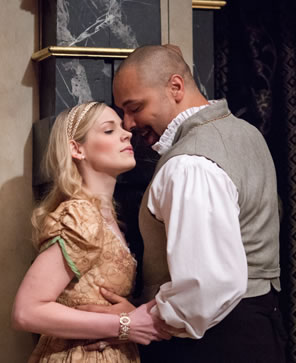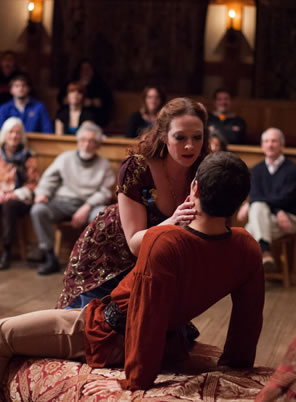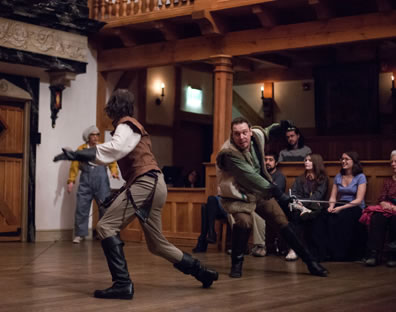The Custom of the Country
In Scholarly Pursuit of Sex and Fun
By John Fletcher and Philip Massinger
American Shakespeare Center, Blackfriars Playhouse, Staunton, Va.
Saturday, March 16, 2013, C–6&7 (center stalls)
Actors' Renaissance Season
Enter Rutilio, trousers down around his ankles, knock-kneed and clutching the crotch of his boxer shorts in aching pain. He's suffering from being overworked by Lisbon's ladies in the male stewes (aka, a brothel of men). Even "an old dead-palsied lady in a litter" who "makes all haste she can" wants a taste of this "lusty and well-complexion'd fellow that does rare tricks." After his soliloquy—"Fye, how my hams shrink under me!"—Rutilio is joined by three other men, all with their trousers collapsed around their ankles exposing their boxer shorts, one man crawling along the floor, and one with an ice pack applied to his groin. These are Rutilio's predecessors in the brothel.

Zenocia (Tracie Thomason) resists the "wonder" of Count Clodio (René Thornton Jr.), above. Later in the play, her betrothed, Arnoldo (Grant Davis) resists the advances of Hippolyta (Sarah Fallon) below. Such chastity is in short supply in The Custom of the Country at the Blackfriars Playhouse. Photos by Lauren D. Rogers, American Shakespeare Center.
This is not a Farrelly brothers' film, though it could be if they had the raunchy verve to write the kind of script John Fletcher and Philip Massinger* concocted around 1620. The Actors' Renaissance Season's troupe of players, meanwhile, came up with their own suitable touches, such as the fallen trousers and ice pack where the original stage directions have Rutilio entering "with a Night-cap" and the predecessors entering "with Night-caps very faintly." ASC's troupe of experts in Shakespearean theater know how to turn faint night caps into tear-inducing laughter while staying true to the text.
Welcome to what counts as scholarly pursuits at the American Shakespeare Center's replica reconstruction of the Blackfriars Playhouse; and I don't mean that in a snarky way but as credit to what ASC accomplishes here. Scholarship not only can be but should be fun. As much as the studies and knowledge gained in our college days, we recall the parties and lessons learned in our college daze. The real education in attending this long-forgotten Jacobean play—making its North American premiere with this production—is discovering how modern William Shakespeare and his contemporaries (and collaborators, as Fletcher wrote three plays with the old master) really were. Beyond modern, really: I mean, come on, a male brothel? The madam, Sulpitia, indenturing men for the sexual delights of high society's esteemed ladies? If Quentin Tarantino wrote such a thing he'd get lambasted for historical improbability.
 This scene is the funniest but by no means the exception to the play's overall tenor. Even the title is a sexual pun, as the "custom of the country" is that the Italian governor, Count Clodio, requires that he have every bride's maidenhead on their wedding night before their husbands may lie with their newlywed wives. The plot is sillier than any Telemundo novella: how Clodio (René Thornton Jr.) wants Zenocia (Tracie Thomason) beyond her maidenhead, but Zenocia and her betrothed, Arnoldo (Grant Davis), with the help of his brother, the aforementioned Rutilio (Benjamin Curns), escape; how Zenocia is taken by the pirate Leopold (Gregory Jon Phelps), who places her as a servant to the lady in Lisbon he adores, Hippolyta (Sarah Fallon); how Arnoldo and Rutilio end up in Lisbon, the latter killing the braggart Duarte (Chris Johnston) in a duel and escaping the law by the unwitting help of Duarte's doting mother, Guiomar (Allison Glenzer); how Hippolyta takes a liking to Arnoldo and has him kidnapped by her Jewish servant Zabulon (John Harrell) so that she can seduce him; how Rutilio ends up captured by the law but freed by Sulpitia (Abbi Hawk) and ends up in her stewes; how Duarte is really not dead and maneuvers to help Rutilio to the bed of his mother; how a repentant Clodio and Zenocia's father, Charino (Daniel Kennedy), arrive at Lisbon and seek the assistance of the governor, Manuel du Sosa (Ronald Peet), who happens to be Guiomar's brother, to help them find Zenocia and Leopold; how all this winds up in a most pat ending. (I've re-read this paragraph and it is an accurate report; even that bit about the not-dead Duarte helping his would-be murderer to his mother's bed is part of the play's plot.)
This scene is the funniest but by no means the exception to the play's overall tenor. Even the title is a sexual pun, as the "custom of the country" is that the Italian governor, Count Clodio, requires that he have every bride's maidenhead on their wedding night before their husbands may lie with their newlywed wives. The plot is sillier than any Telemundo novella: how Clodio (René Thornton Jr.) wants Zenocia (Tracie Thomason) beyond her maidenhead, but Zenocia and her betrothed, Arnoldo (Grant Davis), with the help of his brother, the aforementioned Rutilio (Benjamin Curns), escape; how Zenocia is taken by the pirate Leopold (Gregory Jon Phelps), who places her as a servant to the lady in Lisbon he adores, Hippolyta (Sarah Fallon); how Arnoldo and Rutilio end up in Lisbon, the latter killing the braggart Duarte (Chris Johnston) in a duel and escaping the law by the unwitting help of Duarte's doting mother, Guiomar (Allison Glenzer); how Hippolyta takes a liking to Arnoldo and has him kidnapped by her Jewish servant Zabulon (John Harrell) so that she can seduce him; how Rutilio ends up captured by the law but freed by Sulpitia (Abbi Hawk) and ends up in her stewes; how Duarte is really not dead and maneuvers to help Rutilio to the bed of his mother; how a repentant Clodio and Zenocia's father, Charino (Daniel Kennedy), arrive at Lisbon and seek the assistance of the governor, Manuel du Sosa (Ronald Peet), who happens to be Guiomar's brother, to help them find Zenocia and Leopold; how all this winds up in a most pat ending. (I've re-read this paragraph and it is an accurate report; even that bit about the not-dead Duarte helping his would-be murderer to his mother's bed is part of the play's plot.)
The language is as lusty as the characterizations of the sex-driven, preening Clodio ("Do you see nothing in me? Nothing to catch your eyes, nothing of [dramatic pause] wonder?" whereupon Thornton turns his back to Zenocia, showing off all sides of his "wonder") and the over-smitten Hippolyta ("Upon my conscience, I must ravish thee, I shall be famous for the first example," she says to Arnoldo as she ties him up—that tying him up is in the original text, by the way). But the character with the most active libido is Rutilio. "Would I were the next heir," he says upon learning of the custom of the country that gives Clodio the right to bed every bride. Curns plays the womanizer with such unabashed fervor that Barney on How I Met Your Mother would be shocked. Rutilio even takes a pass at Zenocia upon seeing her for the first time, telling his brother—her betrothed—"A dainty wench! Would I might farm his custom." Of course, he considers being sold into the stewes the best possible outcome for his predicament, which sets up the comedy of consequences. "He does perform such wonders—the women are mad on him," Sulpita says. "Give him breath, Mistress," her servant Jaques (Glenzer) implores: "You'll melt him else."
Believe it or not, this play which even Restoration-era audiences considered too indelicate is lumped among the "chastity plays" Fletcher wrote. The shenanigans do end up in a tightly tied moral knot in the final scene as the truly chaste Zenocia, Arnoldo, and Leopold (I love the irony that a pirate is the most honorable-in-love character of the play) get their rewards, and the truly unchaste Clodio, Rutilio, and Hippolyta, as well as the uncivil Duarte, feel reward enough in their reformations.
However, the passage in the play that most startled me has nothing to do with sex, though Rutilio speaks it. As he and his brother whisk Zenocia away from the grasp of Clodio, Rutillo cries, "Du cat awhee, good Count, cry, prithee, cry, O what a wench hast thou lost! Cry you great booby." That's right: a character in a Jacobean play actually calls someone a "great booby." Get the text and see for yourself; the American Shakespeare Center actors modernize nothing that they speak in these plays.
Given the timeless tone of this script, they do timeless costumes, too. In the Actors' Renaissance Season, the 12 players mount the plays without a director in a week's worth of rehearsal time and using only cue scripts—the manner in which plays were produced in Shakespeare's time. The actors also costume themselves, and for this one they mingle some vaguely Renaissance clothes with modern wear (though Peet looks like he borrowed a Victorian overcoat and top hat from the stock of Christmas Carol costumes for his Governor du Sosa). They also translate the characters into caricatures of our own times, much as the playwrights for the King's Men—Shakespeare originally, followed by Fletcher—would have done in their own times (character names can be indicators: Rutilio certainly is into rutting). So, where the Jew might have been the alien agent of criminality for early 17th century England, the Russian mafia provides that image for us, and Harrell does an exquisite piece of work with his Zabulon; he may be wearing a skullcap, but in scruffy beard, shades, Russian accent, and slick mobster manner, he could be 007's next nemesis.

Sparks literally fly as Duarte (Chris Johnston, left) engages in a swordfight with Rutilio (Benjamin Curns) as Duarte's page (Abbi Hawk) watches in the background, along with the audience sitting on the gallant stools during a performance of The Custom of the Country at the Blackrfirars Playhouse. Photo by Lauren D. Rogers, American Shakespeare Center.
Speaking of which, the fight scene between Curns' Rutilio and Johnston's Duarte was so intense, we literally saw a spark fly from the clashing swords (not just my imagination; Sarah saw it, too). I've seen electrifying stage combat, but never actual sparks.
With this we have now seen all five plays in this year's Actors' Renaissance Season repertoire. Though it is not as solid top to bottom as the 2012 troupe, the company is talented enough that these five productions make up the strongest season I've ever seen at a theater, in corps performance and, most of all, in corps imagination. All of these plays mounted by 12 individuals are more cohesively whole than many a professional production on the tony stages of the world's theater centers. Contributing to this quality might be the plays themselves, but who would have thought so when perusing the playbill? Julius Caesar exciting? Henry VIII arresting? Two Noble Kinsmen movingly funny? The Country Wife such a party? The Custom of the Country so daring? All tightly played at quick clips without the single vision of a director?
One member of the audience exemplifies what's happening here. Before seeing the play, we met a woman who had done her master's thesis on The Custom of the Country. She was so excited to have the chance to actually see the play. We didn't catch up with her afterwards, but we could tell she was enjoying the show. Yes, these plays are the stuff of scholarly pursuits, including the Shakespeare, especially considering that his plays are Julius Caesar and the two obscure works he co-authored with Fletcher. Even many people who love Shakespeare go to his plays to be edified more than to be entertained. But Shakespeare, Fletcher, Massinger, and Country Wife's William Wycherley wrote their plays to entertain; to make people laugh, make them cry, make them lean forward at the suspense, make them cringe at the violence, and make them go "they didn't" with the sex and language. Four hundred years from now, perhaps Argo, Lincoln, Dumb and Dumber, Bridesmaids, and The Hangover will be the stuff of masters' theses. Today, five plays first played before audiences between 1599 and 1675 are the stuff of blockbuster theater. As the ASC actors stay true to the text of these plays, they also stay true to their purpose: to entertain.
Eric Minton
March 21, 2013
[*Some modern editions of and references to this play credit Francis Beaumont instead of Massinger as the co-author, perhaps in part because the play is included (along with other Fletcher-Massinger compositions) in the Fletcher-Beaumont Folio of 1647. Most scholars credit Massinger on stylistic grounds and because the play has reference points to 1619, three years after Beaumont's death.]
Comment: e-mail [email protected]
Start a discussion in the Bardroom



 Find additional Shakespeareances
Find additional Shakespeareances